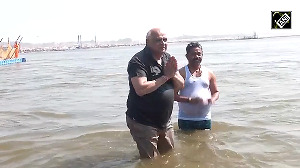Setting the tone for the upcoming chief ministers' meeting on NCTC, Home Minister P Chidambaram on Wednesday discounted the fears of states that it would encroach upon their rights as he underlined that fighting terror was a shared responsibility between the Centre and states.
He also questioned the opposition to the amendment to the BSF Act, saying it gave no extra power to the para military force but was only aimed at regularising its deployment in states which was not provided under the original law.
"Dealing with violence and terrorism is the shared responsibility. While we are willing to share our responsibility, we want states to share their responsibility," Chidambaram said in reply to a debate in the Lok Sabha on the Demand for Grants for the home ministry.
The demand for grants was passed by a voice vote after the cut motions were defeated.
Referring to the NCTC which is being opposed by many chief ministers, including UPA ally Mamata Banerjee of West Bengal, Chidambaram said it was an off-shoot of the Unlawful Activities (Prevention) Act that was debated and passed by Parliament in 2004 and amended in 2008.
"I am accused of encroaching states' powers. What power am I encroaching upon?... (Under the NCTC), the designated agency may arrest an accused and hand him over to the nearest police station immediately," he said.
He was referring to the UAPA's provision 43(A) which empowers police to arrest and search and seize, which is being opposed by the states.
"You should have said what I was doing for last three years. I was tardy.. I delayed it for three years. But you are accusing me of encroaching your powers," Chidambaram said addressing the states.
Chidambaram reserved his detailed statement on NCTC for the May 5 meeting but said that many of the chief ministers opposing the anti-terror hub had not read the three-page statement issued by him on the issue.
On the amendment to BSF Act, he said the force was not being given more powers but only its preamble had to be changed to allow regularised deployment of the force in violence-hit states like Chhattisgarh and Odisha.
As per the original Act, BSF could be deployed only the border. "Today I am forced to deploy (BSF) in two states -- Chhattisgarh and Odisha. So we are saying amend the act," he said, adding the force cannot be deployed unless the Chief Minister of the concerned state wants.
Underlining the need for cooperation between the Centre and states in fighting terrorism and extremism, the home minister pointed out that India's neighbourhood was the most troubled with all the major terror groups like Al Qaida, Lashkar-e-Tayiba and Harkat-ul Jehad-e-Islami based there.
"We are not less vulnerable, we are not more vulnerable.
We are as vulnerable as we were... Unless we accept the shared responsibility, we cannot meet the threat to security," he said.
He noted that in the run up to the Mumbai attacks of 2008, the country witnessed seven to eight terror strikes but after that only three terror attacks have taken place.
"These are three blots," the Home Minister said even as emphasised that the capacity to deal with terror has been beefed up.
Citing the improvement of situation in Jammu and Kashmir and northeastern region, Chidambaram said he was optimistic that peace will prevail in the country despite violence here and there.
"I am optimist about future. My experience with last three years of Jammu and Kashmir and northeast convinced me that people will realise the futility of violence," he said.
The home minister said people will stand up against violence and support the government in taking strong action against terrorism and violence.
"We have to work together, states and Centre have to work together, political parties have to work together to make this country safe and secured," he said.
Chidambaram contested the opposition charge that India has not been able to contain terrorist attacks like the United States did after the 2001 terror strikes.
Terming it as a "popular myth", he said that the US had witnessed six terror attacks and three nearly successful terror attacks in that country since 2001.
The home minister said the Central government has taken several steps for the capacity building of the Central paramilitary forces.
Chidambaram regretted that there are five lakh vacancies in state constabulary out of the 20 lakh sanctioned posts. He, however, made it clear that he was not attacking the states as he realises their difficulties.






 © 2025
© 2025